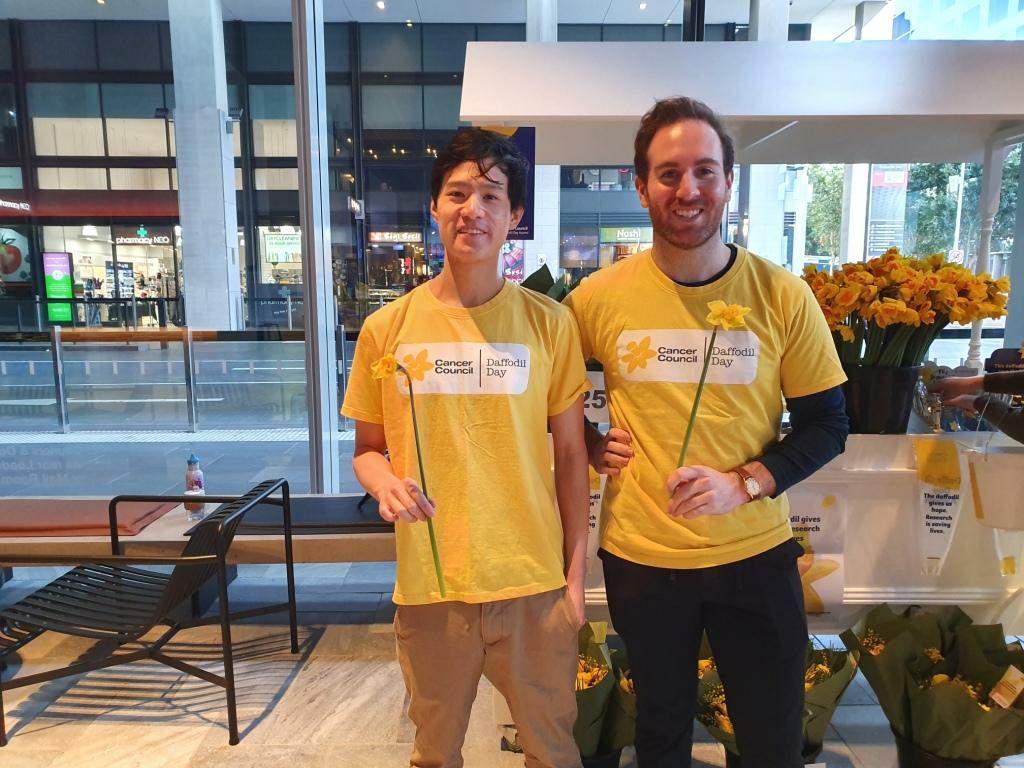
Image: Melbourne Law School interns, Jonathan (left) and Max (right), volunteering on Daffodil Day
Twice a year, we’re fortunate to host students through the Melbourne Law School Public Interest Law Initiative Internship Program. The Program allows law students to apply their knowledge practically, while making important contributions to our work for subject credit. Our latest interns, Max and Jonathan, share what motivates and interests them, what they did during their internship, and where they see themselves going in the future.
What motivated you to do an internship with the McCabe Centre?
Max: I wanted to see health law in action. The McCabe Centre is so unique in the way it approaches the intersection of law and modern health care issues. Being an intern offered great insight into the challenges faced by people with cancer in Australia and by the public sector preventing cancer.
Jonathan: Given McCabe Centre’s work in how law affects cancer treatment and prevention, the internship gave me a unique window into the world of health law. For me this was a chance to not only observe health law in action, but also to learn how people in health law have used their legal skills and experiences to advance health causes.
Why are you interested in public health law?
Max: Within health law, disease prevention and control always seemed to be interesting and challenging subject matters because the law can be used in all sorts of ways to change the health care landscape. Unlike other areas of the law, health law is often concerned with improving the situation for the most vulnerable people in the community, which I think covers the work with an optimistic gloss.
Jonathan: A lot about health care is determined by factors beyond the immediate control of health care workers. The care that patients receive is heavily influenced by legal and political factors, so it’s important to understand the legal context of the field. This helps you be aware of who’s pulling the strings and empowers you to pull back at them if you need to.
What did you work on during your internship?
Max: I worked on a wide range of topics, from researching alcohol labelling to preparing for conferences, every topic has given me fresh insight into how impactful health law really is. Two areas that I focussed on in particular were access to clinical trials, and the law of informed financial consent, comparing Australian law to that of other jurisdictions like New Zealand. One of the many perks of the internship was a great chance to hone my writing and legal research skills – something law students are always looking for.
Jonathan: I worked on a very broad range of topics, including a submission to the Australian Human Rights Commission on the importance of the right to health, research on international treaties, and research on the issues associated with health screening tests being marketed directly to consumers. I reviewed Cancer Council Position Statements, and publications informing patients about their legal rights. I also assisted at a workshop on human rights and the prevention of non-communicable diseases and at a conference on the global governance of alcohol.
What do you hope to do after Uni?
Max: I can see myself working in the public sector, preferably at the Commonwealth level. Although having a broad range of interests (legal and non-legal) means I haven’t yet been able to settle on a single career path. Now that I’ve seen how central government and public policy are to a successful health system, I feel slightly surer than I did at the beginning of the internship that government is the position from which I can do the most good. And isn’t that what everyone should hope to do after Uni...?
Jonathan: I plan to enrol in medical school shortly after I finish my studies. While it’s not quite a standard career pathway for a law student, I’ve come to realise that law as an academic pursuit is as much a set of life skills as it is technical expertise. Through my internship, I’ve learned that many of the skills I’ve developed at law school will remain relevant, even in medical practice, and would enhance what I can bring to the table as a doctor.